The RSS has today announced its Statistics of the Year for 2020.
The statistics are categorised into international and UK and there is a winner for each, as follows (click on each to be taken to further details):
Winners
- International Statistic of the Year: 332 days - the length of time between scientists publishing the genetic sequence of Covid-19 (11 January 2020)and an effective vaccine being administered (8 December 2020).
- UK Statistic of the Year: 17,750 - the number of excess deaths in April in care homes in England and Wales over four weeks (4th April - 1st May). Total deaths in care homes were 200% higher than the five-year average, compared with 85% higher in the home, and 65% higher in hospitals.
Highly commended statistics (International and UK)
- 5.5 million years: according to the latest estimates, over three trillion minutes will be spent on Zoom globally this year – equivalent to around 5.5 million years.
- 3 out of 5: only three out of five people worldwide have basic handwashing facilities, according to the latest estimates.
- 19 times: black men aged 18-24 in London are, on average, nineteen times more likely to be stopped and searched, in comparison to the city’s overall population.
- 19%: around one in five (19%) adults were likely to be experiencing some form of depression during the coronavirus pandemic (June 2020). This almost doubled from an average of around one in ten (10%) before the pandemic (July 2019 to March 2020).
Professor Jennifer Rogers, chair of the judging panel and RSS Vice President for External Affairs, said: 'Our winning statistics capture some of the challenges faced by all in a year which, it’s safe to say, has been like no other. During the pandemic, the public has been confronted daily with statistics which have had major repercussions on their day-to-day lives. The 2020 list highlights the role statistics play in a year where they have been more important than ever.'
Stian Westlake, Chief Executive of the RSS, said: 'With the R number and false positives making headline news, Covid has made statisticians of us all. Good statistics cut through confusion and spin and help us understand what’s really going on. Our winning statistics help make sense of events in a strange and sobering year.'
Many thanks to RSS Statistical Ambassadors, Anthony Masters and Michael Dunne-Willows for their assistance and fact-checking.
Read Anthony Masters' blog, 'Behind the numbers' for more commentary on the winning and highly commended statistics.
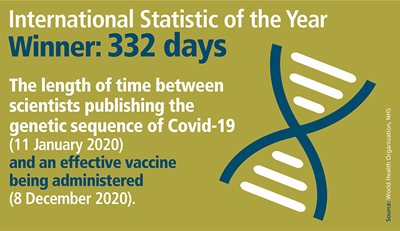
Winner - International Statistic of the Year
332 days
The length of time between scientists publishing the genetic sequence of Covid-19 (11 January 2020) and an effective vaccine being administered (8 December 2020).
Source: World Health Organization, NHS
The judging panel chose this statistic as it highlights the remarkable efforts by the global scientific community in developing effective protection against Covid-19. The speed of the programme - from the genetic sequencing of the virus to the first jab being received as part of a vaccination programme - is widely considered to be unparalleled in the history of disease outbreaks. With so much sorrow and disruption caused by the pandemic, the emergence of new vaccines has provided hope of a return to normality for 2021.
Professor Liberty Vittert, statistician and member of the judging panel, said: '"When will there be a vaccine?" has been a question on all our lips this year and while only very few have benefitted from one so far, I think many of us did not expect such a breakthrough in 2020. After many months of distressing numbers in the news, the judging panel are pleased to showcase a positive figure for our International Statistic of the Year.'
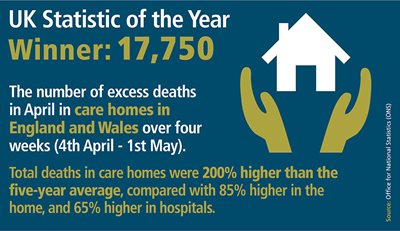
Winner - UK Statistic of the Year
17,750
The number of excess deaths in April in care homes in England and Wales over four weeks (4th April - 1st May). Total deaths in care homes were 200% higher than the five-year average, compared with 85% higher in the home, and 65% higher in hospitals.
Source: ONS
The judging panel chose this figure as it highlights the devastating impact coronavirus has had on those in care homes – where, since the 7th of March in England and Wales, there have been, so far, an estimated 25,629 excess deaths. In the early weeks of the pandemic, television news crews in Italy captured harrowing footage of overcrowded hospitals; in contrast, excess deaths in the UK largely happened off-camera, especially in care homes. Across all locations, England and Wales had a higher rate of excess deaths than Scotland and Northern Ireland. The panel’s chosen statistic tells an important story that the cameras missed.
Professor Sir David Spiegelhalter, statistician and member of the judging panel, said: 'It’s a sad fact that the public this year have had to get their heads round the different types of mortality statistics being published on a regular basis. This stark statistic gives an insight into the sheer devastation caused by coronavirus.'
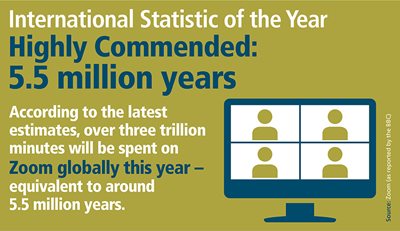
Highly Commended – International Statistic of the Year
5.5 million years
According to the latest estimates, over three trillion minutes will be spent on Zoom globally this year – equivalent to around 5.5 million years.
Source: Zoom (as reported by the BBC)
With many not able to meet in person, videoconferencing has been both a cultural and workplace phenomenon this year, with social and work interactions taking place on platforms such as Zoom, Microsoft Teams and Jitsi. Videoconferencing has allowed parts of the workforce and economy to remain active and could lead to a more permanent transition to remote working post-pandemic. The panel chose this statistic as it highlights the huge change in our communication with others – which for many this year has been via a screen.
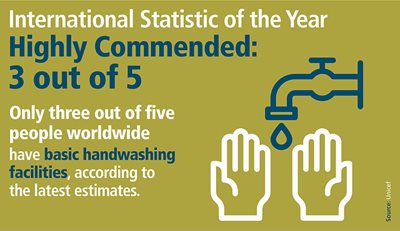
3 out of 5
Only three out of five people worldwide have basic handwashing facilities, according to the latest estimates.
Source: Unicef
This statistic captures one of the world’s biggest problems – a lack of sanitation. Increased and thorough handwashing has been a key message of many governments and health bodies this year, but this statistic shows that globally, there is far from a level playing field in access to even the most basic of facilities. The judging panel highly commend this statistic as it highlights one of the biggest health inequalities we face today.
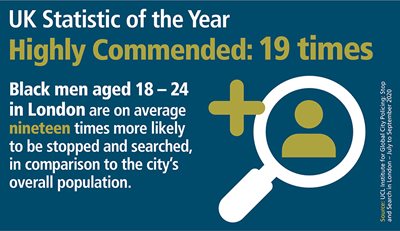
Highly Commended – UK Statistic of the Year
19 times
Black men aged 18-24 in London are, on average, nineteen times more likely to be stopped and searched, in comparison to the city’s overall population.
Source: UCL Institute for Global City Policing: Stop and Search in London – July to September 2020
This research looks at the experience of police stop and search for Londoners from July to September - at the height of the pandemic. The judges chose this statistic for its focus on policing and race, which became a key topic of discussion this year after the killing of George Floyd in the US in May and the widespread anti-racism protests that followed as part of the Black Lives Matter movement.
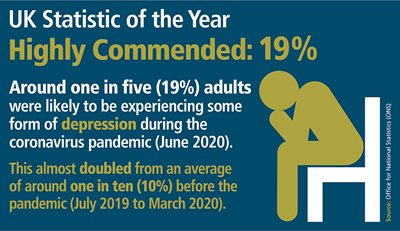
19%
Around one in five (19%) adults were likely to be experiencing some form of depression during the coronavirus pandemic (June 2020). This almost doubled from an average of around one in ten (10%) before the pandemic (July 2019 to March 2020).
Source: ONS
This research from ONS provides an understanding of Britain’s mental health during the height of the pandemic. This survey found that those who were young, female, disabled or unable to afford an unexpected expense, were more likely to be experiencing some form of depression. The panel chose this statistic as it gives a powerful insight into the nation’s wellbeing during what has been a difficult year for many.
The judging panel for this year's statistics of the year comprised:
- Professor Jennifer Rogers (chair) - Head of Statistical Research at PHASTAR and RSS Vice-President for External Affairs
- Ben Page - Chief Executive, Ipsos MORI
- Professor Christl Donnelly - Professor of Applied Statistics, University of Oxford & Professor of Statistical Epidemiology, Imperial College London
- Professor Sir David Spiegelhalter - Chair of the Winton Centre for Risk and Evidence Communication and co-chair of the RSS Covid-19 Task Force
- Dr Gemma Tetlow - Chief Economist, Institute for Government
- Hetan Shah - Chief Executive, British Academy
- Dame Jil Matheson - former UK National Statistician
- Professor Liberty Vittert - RSS Statistical Ambassador and Professor of the Practice of Data Science, Washington University
- Mark Easton - Home Editor, BBC
- Mona Chalabi - Data Editor, Guardian US
- Stian Westlake - Chief Executive, Royal Statistical Society.
Follow the hashtag #StatsoftheYear.
Our award-winning RSS initiative is now in its fourth year – read more about the history of the initiative, including previous winners.
Back to top